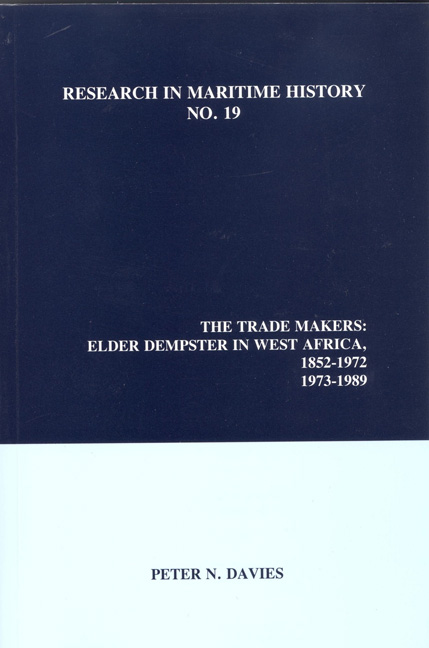Book contents
- Frontmatter
- Table of Contents
- List of Illustrations
- Foreword
- Introduction (Second Edition)
- Foreword
- Preface
- Acknowledgments
- Introduction to the Original Edition
- Frontispiece
- Part One The Pioneers
- Part Two Elder Dempster And Company
- Part Three Elder Dempster And Company Limited
- Part Four Elder Demster Lines Limited
- Part Five The End Of An Era
- List of Appendices
- Appendices
- Bibliography
- Index
Foreword
- Frontmatter
- Table of Contents
- List of Illustrations
- Foreword
- Introduction (Second Edition)
- Foreword
- Preface
- Acknowledgments
- Introduction to the Original Edition
- Frontispiece
- Part One The Pioneers
- Part Two Elder Dempster And Company
- Part Three Elder Dempster And Company Limited
- Part Four Elder Demster Lines Limited
- Part Five The End Of An Era
- List of Appendices
- Appendices
- Bibliography
- Index
Summary
It is fifty years since my introduction to the business scene in West Africa, and I was particularly fortunate to have been throughout my career fairly close to where the action was taking place. My first appointment was as the second male member (there were nineteen girl clerks) of the newly formed Statistical Department in the Niger Company when efforts were being made to bring order and system into the newly acquired group of companies. From there I became personal assistant to the Vice Chairman, who was in effect the Managing Director. From the beginning, therefore, I was able to see Elder Dempster in its rightful position as an important element in West African Trade - as the mainstay of ocean carriage and, consequently, as an arbiter of that most important cost element to the trader, freight. At the lower end of the scale, my own timetable was governed by the fortnightly sailing of the mailboat which had to be caught. Born and brought up in a seaport, I was fascinated by ships and shipping but it was something entirely new to hear these subjects discussed at a top managerial level. My subsequent promotion was to lead me to become Chairman of Palm Line (Unilever's shipping fleet), and eventually at the end of my career, Chairman of Unilever Limited.
My first voyage in an Elder Dempster vessel was in September 1926, when I accompanied the Vice Chairman of the Niger Company on a visit which extended throughout West Africa, and it was largely that experience which enabled me to appreciate the opposing points of view when the two companies were set on a collision course. But even though events must have been extremely painful to both sides (more so for Elder Dempster than for the United Africa Company, which had a fairy godmother in Unilever), there was within the rank and file of both companies a great bond of sympathy, no doubt partly based on a common Merseyside origin. Part of the difficulty arose from Elder's determination not to give the larger firms more favourable terms than the smaller ones - a civilised creed more acceptable now than then.
- Type
- Chapter
- Information
- The Trade MakersElder Dempster in West Africa, pp. xviii - xixPublisher: Liverpool University PressPrint publication year: 2000

